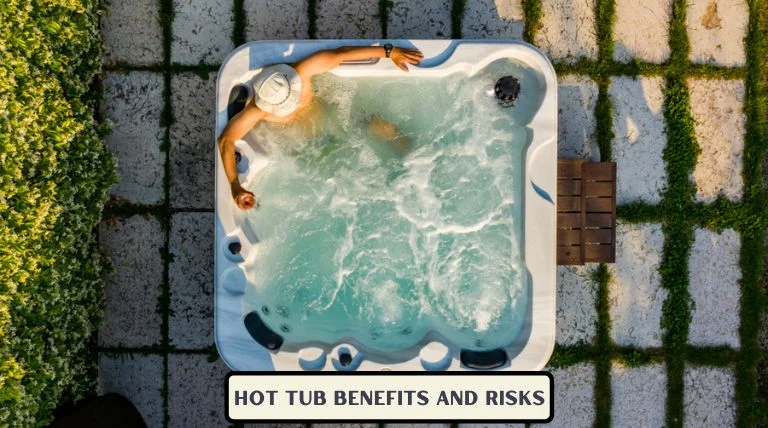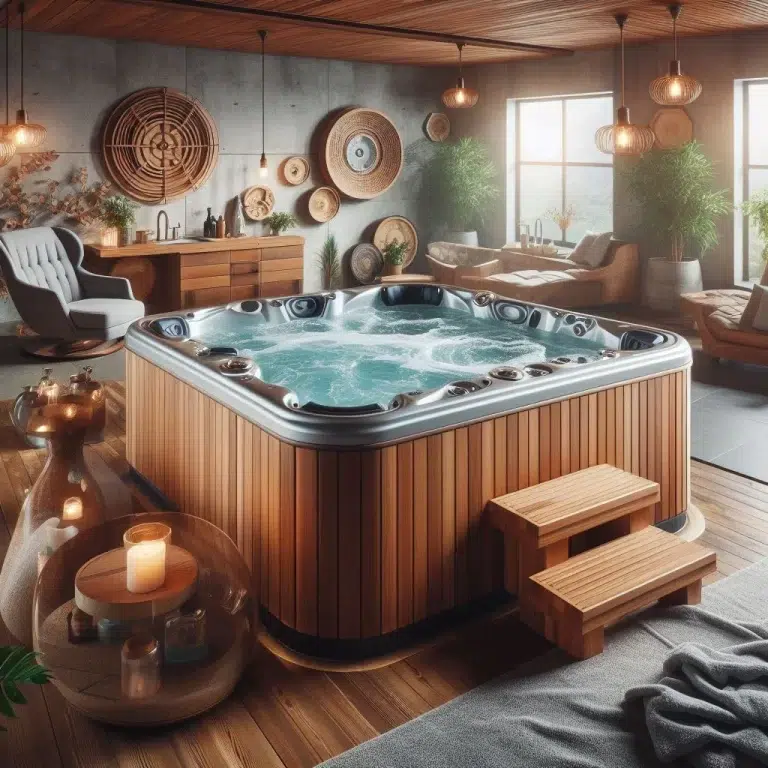Don’t Let the Heat Fool You: Hot Tub Benefits and Risks
A hot tub can be a fantastic way to relax after a long day or to soothe muscles after a workout. However, it’s essential to be aware of Hot Tub Benefits and Risks. This essay will discuss the benefits and risks of hot tub use so that you can make an educated conclusion about whether or not it is right for you.
Hot tubs have long been synonymous with relaxation and luxury, and for good reason. As I dive into the world of hot tubs, let’s uncover the seven surprising benefits and potential risks of indulging in this delightful hydrotherapy experience.
Benefits and risks of using hot tubs:
| Aspect | Hot Tub Benefits | Hot Tub Risks |
|---|---|---|
| Relaxation | Provides a haven for relaxation and stress relief | Prolonged exposure can lead to overheating |
| Pain Relief | Effective for reducing joint and muscle pain | May cause skin irritation due to chemicals |
| Cardiovascular Health | Improves circulation and lowers blood pressure | Harbors bacteria if not properly maintained |
| Sleep Quality | Enhances sleep quality by promoting relaxation | Can lead to circulatory issues in some individuals |
| Skin Benefits | Detoxifies the skin, leaving it refreshed and glowing | Pregnancy and hot tub use require caution |
| Low-Impact Exercise | Allows for low-impact exercise and muscle toning | Children need vigilant supervision in hot tubs |
| Social Bonding | Fosters social and family bonding | Potential for allergies due to water treatment |
This table provides a quick overview of the positive and negative aspects of using hot tubs, helping individuals make informed decisions about whether hot tub use is suitable for their specific needs and circumstances.
Hot Tub Benefits
1. The Warm Embrace: A Relaxation Haven
Hot tubs provide a haven for relaxation and stress relief. The warm, bubbling water soothes your muscles and eases tension, leaving you feeling as if you’ve melted into a state of pure bliss. Imagine a serene evening under the starry sky, with the gentle hum of the jets massaging your worries away.
2. Pain Relief: A Balm for Aching Bodies
Hot tubs offer effective pain relief. Whether you suffer from chronic conditions like arthritis or simply need to alleviate everyday aches and pains, soaking in a hot tub can be a game-changer. The warm water and buoyancy can reduce joint pain and muscle soreness.
3. Heartfelt Benefits: Improving Cardiovascular Health
Hot tubs can benefit your cardiovascular health. The heat causes your blood vessels to dilate, promoting better circulation and lowering blood pressure. This can be particularly beneficial for those with heart conditions, as it provides a gentle, low-impact way to improve heart health.
4. Zen-like Sleep: Enhanced Sleep Quality
Hot tubs can improve sleep quality. Soaking in a hot tub before bedtime helps your body relax and de-stress, making it easier to fall into a deep, restful slumber. Combining heat, buoyancy, and relaxation is a recipe for better sleep.
5. Skin Deep: Benefits for Your Skin
Hot tubs can benefit your skin. The warm water opens up your pores and encourages sweating, helping to detoxify your skin. This process can leave your skin looking refreshed and rejuvenated, giving you a radiant glow.
6. Weightless Workout: Low-Impact Exercise
Hot tubs can serve as a low-impact exercise tool. Water resistance allows you to perform exercises that help with muscle tone, flexibility, and weight management. It’s an excellent option for those who want a gentle workout without the stress on their joints.
7. Social and Family Bonding
Hot tubs foster social and family bonding. Whether it’s spending quality time with your loved ones, having intimate conversations, or hosting a casual get-together, hot tubs provide the perfect setting for forging deeper connections. For more reading about Safety Precautions for hot tub.
Now, let’s take a moment to explore the potential risks:

Hot Tub Possible Risks
While hot tubs offer many benefits, it’s essential to be aware of their potential risks. Here, we’ll delve into the possible downsides and safety considerations associated with hot tub use.
1. Overheating and Dehydration
Hot tubs are designed to be hot, and that heat can have consequences. Prolonged exposure to high temperatures can lead to overheating, causing symptoms such as dizziness, nausea, and even fainting. The elevated heat can also cause excessive sweating, which may lead to dehydration. To prevent these risks, limiting your time in the hot tub and ensuring you stay well-hydrated is crucial.
2. Skin Irritation
Hot tub chemicals and improper maintenance can cause skin irritation. The water in hot tubs is typically treated with chemicals to maintain hygiene and clarity. If the chemical balance is not correctly maintained, it can lead to skin issues like rashes or itching. To minimize this risk, regularly check and adjust the chemical levels in your hot tub and ensure it is clean.
3. Infection Risk
Hot tubs can harbor harmful bacteria. A hot tub’s warm and wet environment can be a breeding ground for bacteria if not properly maintained. This can lead to infections, particularly if you accidentally ingest water containing harmful microorganisms. Regular cleaning, sanitization, and maintaining the right chemical balance can mitigate this risk.
4. Circulatory Issues
Individuals with circulatory problems should exercise caution. The heat in hot tubs can cause blood vessels to dilate, potentially leading to a drop in blood pressure. People with circulatory conditions like low blood pressure should be cautious when using hot tubs to avoid sudden drops in blood pressure that could lead to fainting or dizziness.
5. Impact on Pregnancy
Pregnant women should consult with a healthcare provider. Soaking in a hot tub during pregnancy can raise the body’s core temperature, which is not advisable. It’s recommended that pregnant women consult with their healthcare provider before using a hot tub to ensure the safety of both the mother and the baby.
6. Safety for Children
Children in hot tubs require vigilant supervision. Hot tubs are not recommended for young children. If children can use a hot tub, strict supervision is essential to prevent accidents or injuries, as they can easily slip or become overwhelmed by the heat.
7. Potential Allergies
Chemicals used in hot tubs can trigger allergies. Some individuals may be sensitive or allergic to the chemicals used for water treatment. Skin reactions or respiratory issues can occur as a result. If you have known allergies, consult your healthcare provider before using a hot tub.
For additional information, visit Hot Tub Patio, or if you’re interested in more reading, see our Guide.
Dangers of hot tubs and alcohol
Hot tubs are often a luxurious and relaxing way to unwind after a long day. However, people should be aware of some dangers associated with hot tubs before using them. When combined with alcohol, the risks of hot tubs can increase significantly.
Hot tubs can cause dehydration due to the high temperatures. This can lead to dizziness, lightheadedness, and fainting. Alcohol can also dehydrate the body and worsen these symptoms when combined with the hot tub. Therefore, drinking plenty of water before and after utilizing a hot tub is essential, especially if you’ve been drinking alcohol.
Another danger is that they can overheat your body. This can cause heat stroke or exhaustion, which can be very dangerous. Reading more about hot tub safety.
How to enjoy a hot tub safely
If you’re thinking about soaking in a hot tub, there are rare things you should keep in mind to enjoy the experience safely.
- First, it’s essential to know that it can pose a risk of infection, so it’s vital to take precautions if you have any open cuts or hurts.
- Second, stay hydrated by drinking several fluids before and after your soak.
- And finally, listen to your body and don’t overdo it – if you feel dizzy or lightheaded, get out of the tub and cool down.
- With these tips in mind, you can relax and enjoy the benefits of it without worry.
Final Thoughts:
Hot tubs can be a source of incredible relaxation and health benefits. However, like any indulgence, they should be enjoyed in moderation, with an awareness of the potential risks. So, when used responsibly, a hot tub can be a valuable addition to your well-being routine.
Common Queries:
Are hot tub chemicals harmful? Yes, some hot tub chemicals can be harmful if not used correctly. Always follow instructions and handle them with care.
Are hot baths healthy? Hot baths can offer relaxation, muscle ache relief, and better sleep. However, excessively hot water or long soaks can be dehydrating.
Is it safe to go in a hot tub every day? Generally, it’s not recommended for daily use. Limit your soaks to short sessions and avoid super-hot temperatures.
Is a hot tub bad for your skin? It can be. Chemicals and hot water can dry out skin. Moisturize after and limit your time in the tub.
Who should not use a hot tub? Pregnant women, those with heart conditions, young children, and anyone with sensitivities to heat or chemicals. Always consult your doctor if you have concerns.
Should you shower after a hot tub? Yes! Rinse off chemicals and any bacteria that might be present in the water.
What age should not go in a hot tub? It’s best to consult a pediatrician. Generally, young children have difficulty regulating body temperature, so hot tubs are often discouraged.
Q. What is hydrotherapy?
Hydrotherapy is a treatment that uses water to relieve pain and improve overall health by increasing blood flow, improving circulation, and relaxing muscles. Hydrotherapy is often used for physical therapy treatments.
Thanks you for reading this article, if you have any question about hot tub benefits and risks please comment below.









